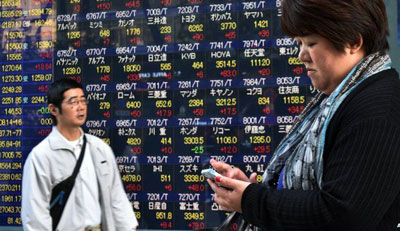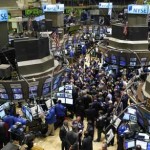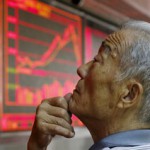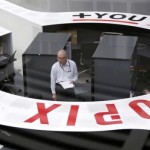Chinese shares fall another 8% despite more measures

Mainland Chinese shares continued to slide on Wednesday, falling more than 8% on opening.
The slump came despite more moves by China’s regulators to try and stabilise the recently volatile market.
The Shanghai Composite had recovered some losses by early afternoon and was down 3.88% at 3,582.50.
Hundreds more listed companies announced a halt in trading of their stocks – fearing the values of their firms would be wiped out.
Chinese regulators made a string of pledges on Wednesday to try and ease the “panic sentiment” in the market.
Other efforts included making more money available to brokerages from its state-backed margin finance firm.
Investors in China rely on margin financing from these brokerages to borrow money to buy stocks.
And insurers were given the go-ahead to invest more in blue chip stocks – with the industry watchdog raising limits from 5% of their total assets up to 10%.
But none of the announcements inspired confidence.
Analysis: John Sudworth, BBC Correspondent, Shanghai
The risk of intervening in an attempt to stop people panicking is that they’ll only panic more.
The confidence measures are in full swing – new share offerings have been suspended, brokerages have been ordered to buy shares, and the Chinese state has promised to provide sufficient liquidity to keep the markets up.
But confidence continues to evaporate and hundreds more firms have announced trading halts, taking the total now seeking temporary respite from the storm to more than 40% of the market.
The government appears to be motivated by the fear of a knock-on effect on the real economy as stock market losses hit consumer spending.
But some analysts wonder why it is staking its authority on an attempt to shore up a market that – despite recent sharp losses – is still well up on where it was a year ago.
Greece worries
Hong Kong’s Hang Seng index was down 4.2% at 23,926.09, mirroring falls on China’s mainland.
Markets in the rest of Asia were also lower – as investors remained cautious about the uncertainty over Greece’s position in the eurozone and the lack of a resolution to the debt crisis.
Eurozone leaders have given Greece until the end of the week to come up with a proposal for sweeping reforms in return for loans that will keep it from crashing out of the eurozone.
Japan’s Nikkei 225 index was down 2.24% to 19,919.89.
Investors took little comfort from data that showed that Japan recorded its second highest monthly current account surplus in the past five years in May, beating expectations.
The current account – a wide measure of trade – saw a surplus of 1.88tn yen ($15.3bn; £9.9bn) in May. That marks the eleventh consecutive surplus on a boost from a weaker yen.
In Australia, shares were lower as the price of iron ore – one of its biggest exports – fell almost 6% to a three month low.
The benchmark S&P/ASX 200 index was down 1.78% at 5,482.20.
Shares of mining heavyweights BHP Billiton and Rio Tinto weighed on the index, down 2.3% and 2.9% respectively.
South Korea’s Kospi index was lower by 1.04% to 2,019.04 as investors looked forward to the central bank’s decision on interest rates on Thursday.
The Bank of Korea is widely expected to keep interest rates on hold after cutting them last month to boost the economy from the outbreak of Middle East Respiratory Syndrome (Mers).
Source: BBC – Chinese shares fall another 8% despite more measures





























